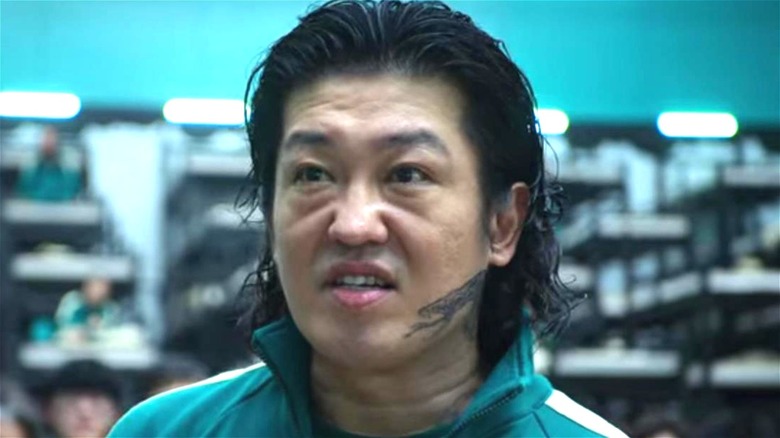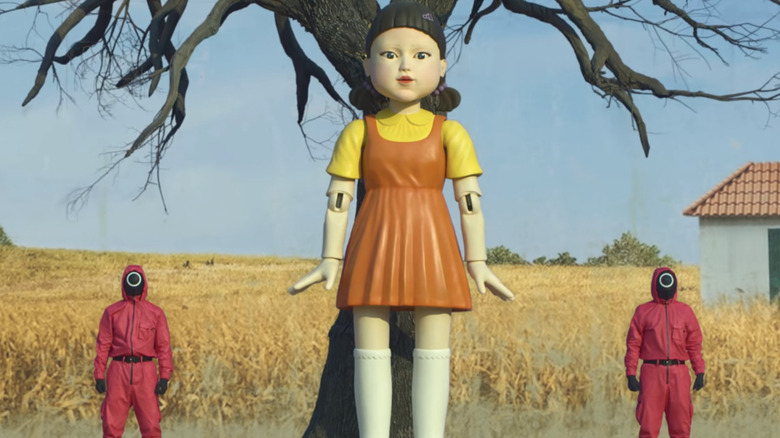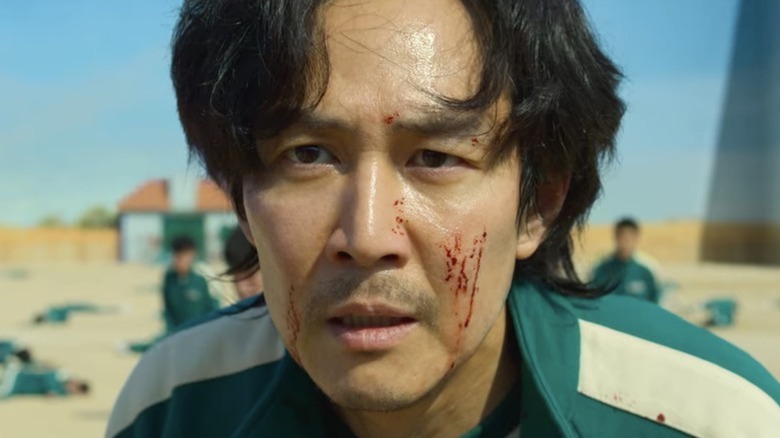The Part Of Squid Game That Fans Agree Went Too Far
Starting on September 17, 2021, many people turned on Netflix only to be greeted by a new series. "Squid Game" looks like a fun watch on the surface, and with a delightful title like that, how bad could it be? It turns out to be one of the most intense thrillers the streaming platform has ever come out with, and it will leave you on the edge of your seat as you binge-watch the first season, waiting to see who lives and who dies.
The premise of "Squid Game" is relatively straightforward. Hundreds of people receive invitations to compete for the chance to win more money than any of them have seen in their lives. All the competitors come from dire financial straits, so it's literally a life-changing opportunity. They have to participate in six days' worth of games to see who comes out on top. The only catch is that if you lose a game, you lose your life. It ups the ante, calling to mind similar plots in "The Most Dangerous Game" and "Cheap Thrills." It's a brutal watch, especially if you decide to watch the entire first season in one sitting, but there's one aspect of the proceedings that leaves an awful taste in viewers' mouths.
Some viewers think it wasn't fair the first batch of contestants didn't know the truth behind 'elimination'
"Squid Game" has its cruelest moment in the first episode. The referees of the games, which fans refer to as red hoods, offer the contestants a chance to walk away or continue to try to win ₩45.6 billion. The problem is that the rulers don't mention what exactly losing a game means, namely how you'll die if you lose. That's a pretty vital piece of information because naturally, people will want to play without it. Given the option of becoming rich and just going home with what you had, most people would choose to play the game. However, when the gunfire goes on display during Red Light, Green Light, the contestants soon learn there's more on the line than just a few dollars.
This fact wasn't lost on viewers, with u/EdmondTantes taking to Reddit to say, "It just seems that the whole moral ambiguity of people volunteering to go through this is lost, knowing that a massacre of unsuspecting people first has to happen." After the first game, the survivors are given the choice to quit or keep going for the prize. But they at least have the knowledge they're putting their lives in jeopardy by continuing. That first batch of people didn't know that, so they couldn't make an informed decision.
"Squid Game" isn't afraid of pushing boundaries and showing the depths people will go to for money. At the end of the day, it's a funhouse mirror of how society functions and how people will sell out their values not to have to worry about cash ever again. But few could argue, the first game was a little much, even by this show's standards.
The Squid Game contract doesn't warn the contestants
In "Squid Game" Episode 2, the third clause of the contract all participants sign comes to play, as they invoke it to arrange a vote on whether to continue the games. However, the other two clauses receive less attention. Technically, the contract does allude to the game's deadly nature in Clauses 1 and 2, which state that a player isn't allowed to stop playing, and that the people who refuse to play will be eliminated. Then again, it's pretty impossible to understand from those lines that losing a game leads to elimination, and that said elimination means death, so getting full consent from the competitors from the get-go seems dubious at best.
The contestants in "Squid Game" are obviously desperate, disoriented, and more than a little bewildered as they enter the game. After all, even if you ignore the toll their difficult lives have taken on them, they've already been through a wringer before signing the contract. If Seong Gi-hun (Lee Jung-jae) is any indication, each contestant has been convinced to take part in a mysterious game, rendered unconscious with a knock-out gas, and transported to a strange new environment. Add that to the fact that it's pretty impossible to understand just what they're up against until the guns start blazing during Red Light, Green Light, and the whole thing indeed comes across as pretty unfair.
Of course, considering the reality game show nature of the game, it's pretty understandable that the people behind it are ultimately more interested in keeping things interesting than in keeping them fair. As user u/the_Halfruin wrote on the Reddit discussion thread: "There isn't really any moral ambiguity involved. Bad guys don't actually need to justify their actions. That's why they're bad guys."


